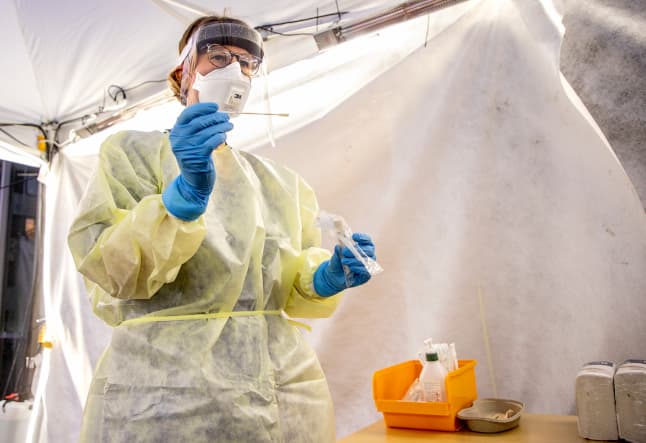Sweden confirms its first case of coronavirus reinfection

The first Swedish case of coronavirus reinfection has been confirmed by a Gothenburg hospital.
A 53-year-old woman tested positive for coronavirus in both May and August, writes Dagens Nyheter (DN). Sahlgrenska University Hospital was able to confirm that she had been infected twice after analysing the genome of the two strains of the virus.
"In ten positions, the virus strain from May was different from the one that was tested in August," doctor Johan Ringlander told DN. "That means we can say they are two separate infections and not the same dormant infection."
The Swedish Public Health Agency has said that people who have been diagnosed and recovered from Covid-19 are likely immune from re-infection for several months, even if they don't have antibodies. But much remains unknown about the coronavirus, so people who have tested positive and recovered are also urged to follow the same health and safety guidelines as everyone else.
The World Health Organisation said in April that antibodies would likely "provide some level of protection" against re-infection, but there is no conclusive evidence. Other cases of reinfection have been reported internationally.
The researchers at Sahlgrenska University Hospital said they were not surprised by the find, but added it did not change what we know so far about coronavirus and immunity.
"We know from other coronaviruses that there is a risk of falling ill again," Ringlander told DN.
"If anything, this shows that the woman actually did get partial immunity. Her illness was very mild the second time, so that indicates that she got a certain level of protection after her first infection."
The woman had developed low levels of antibodies when she was tested in September.
Comments (1)
See Also
A 53-year-old woman tested positive for coronavirus in both May and August, writes Dagens Nyheter (DN). Sahlgrenska University Hospital was able to confirm that she had been infected twice after analysing the genome of the two strains of the virus.
"In ten positions, the virus strain from May was different from the one that was tested in August," doctor Johan Ringlander told DN. "That means we can say they are two separate infections and not the same dormant infection."
The Swedish Public Health Agency has said that people who have been diagnosed and recovered from Covid-19 are likely immune from re-infection for several months, even if they don't have antibodies. But much remains unknown about the coronavirus, so people who have tested positive and recovered are also urged to follow the same health and safety guidelines as everyone else.
The World Health Organisation said in April that antibodies would likely "provide some level of protection" against re-infection, but there is no conclusive evidence. Other cases of reinfection have been reported internationally.
The researchers at Sahlgrenska University Hospital said they were not surprised by the find, but added it did not change what we know so far about coronavirus and immunity.
"We know from other coronaviruses that there is a risk of falling ill again," Ringlander told DN.
"If anything, this shows that the woman actually did get partial immunity. Her illness was very mild the second time, so that indicates that she got a certain level of protection after her first infection."
The woman had developed low levels of antibodies when she was tested in September.
Join the conversation in our comments section below. Share your own views and experience and if you have a question or suggestion for our journalists then email us at [email protected].
Please keep comments civil, constructive and on topic – and make sure to read our terms of use before getting involved.
Please log in here to leave a comment.